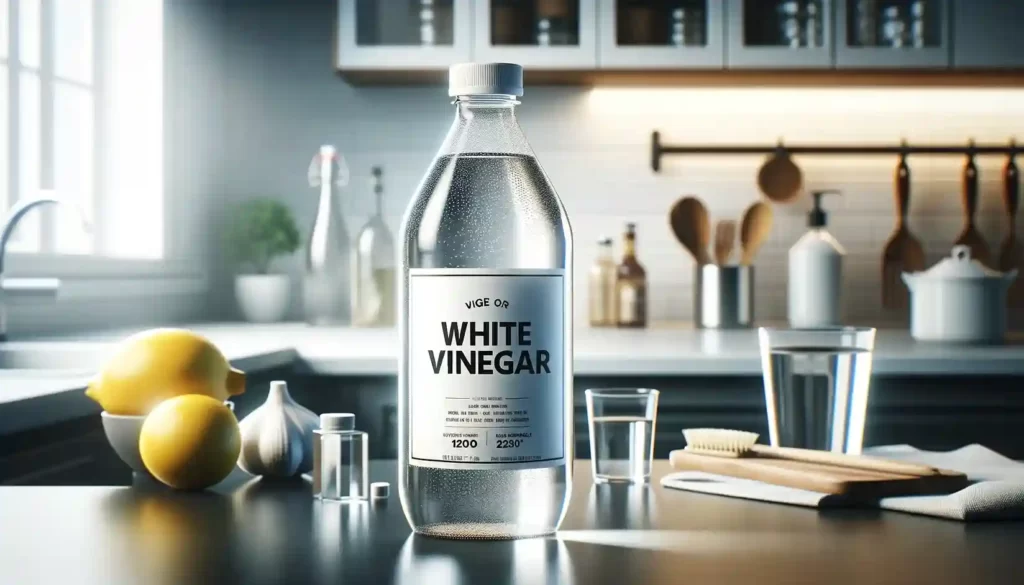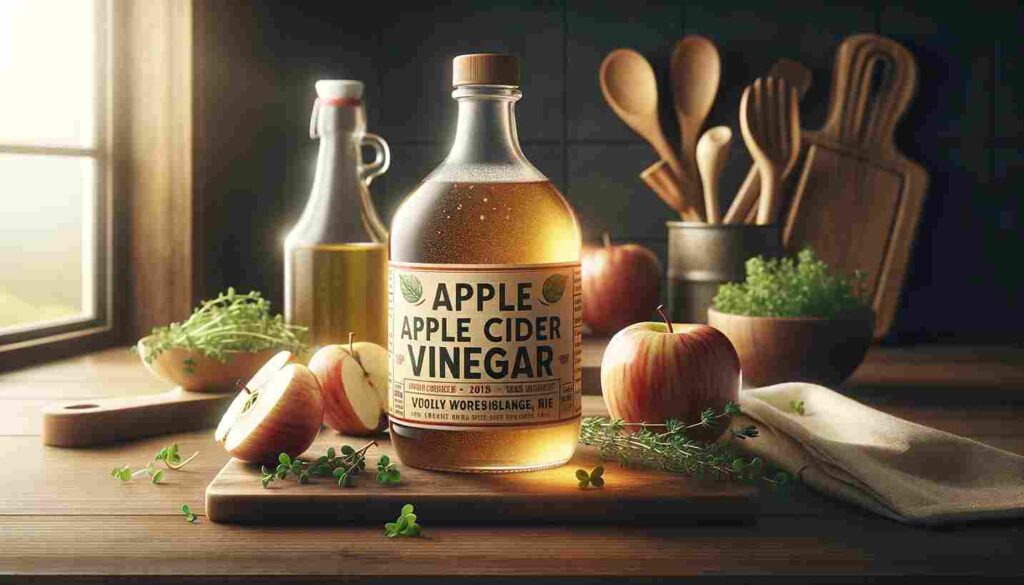Whether it is food or cleaning, vinegar always comes in handy. We recommend that you keep a bottle of vinegar on hand at all times. But which one? You might know that there are two primary types – apple cider vinegar and white vinegar. The problem is that most people do not fully understand the difference between vinegar and apple cider vinegar. Today’s blog post is all about white vinegar vs apple cider vinegar. So, stick around to know everything there is to know about them.
What is Vinegar?
Before we address apple cider vinegar the same as white vinegar, let us talk first about vinegar itself.
There are numerous types of vinegar, and the main difference between them is their source. While they are processed in the same manner, where they come from sets them apart. During the processing (fermentation process), acetic acid is formed, which gives the vinegar its distinct taste and smell.
Earlier, we said that there are various types of vinegar. Let us take malt vinegar as an example. It is made by fermenting grains. You might be thinking about what kinds of grains, right? Although they can be any grains, the most common one is wheat, rice, or barley. If you have ever visited the UK in your life and had fish & chips, their signature dish, you would have indeed tasted malt vinegar. It is a popular ingredient used to add flavor to this dish. Like malt vinegar, there is also coconut vinegar. It comes from fermenting coconut juice.
Vinegar Background – History & Production
The word vinegar comes from the French term “vin aigre”. Can you guess what it means? No? Well, it means sour wine. It is not clear when vinegar’s production started. However, historians trace its usage to ancient civilizations like the Babylonians. They existed around 3,000 BC. They used it as medicine and in cooking.
How is it produced?
One can make it through a fermentation process in which producers add ethanol. There are people who substitute ethanol with sugars from acetic acid bacteria. Interestingly, the traditional fermentation process takes months or even years to complete. However, science has come a long way now. Instead of waiting this long, the manufacturers add a bacterial culture.
What is the purpose of adding it?
The bacterial culture increases oxygen which speeds up the fermentation process. It is how manufacturers meet the ever-growing consumer demand.
Difference Between Apple Cider Vinegar and White Vinegar
There are several key differences between apple cider vinegar and white vinegar. Let us look at the main or common ones:
1. Acetic Acid Content
- White vinegar is stronger than apple cider vinegar. It has 5% to 10% acetic acid, which makes it great for cleaning and pickling.
- Apple cider vinegar has a lower acetic acid content, around 4% to 6%. This lower level makes it less harsh and more suitable for salad dressings and healthy tonics.
2. Taste
- White vinegar is very sour and sharp. It’s so strong that you usually don’t want to taste it on its own.
- Apple cider vinegar has a milder, fruity taste because it’s made from apples. It adds a nice flavor to foods without being too overpowering.
3. Appearance
- White vinegar is clear and looks like water. This makes it good for cleaning without staining.
- Apple cider vinegar is light brown, like apple juice. Its color can slightly change the look of the food you put it in.
4. Health Benefits
- Apple cider vinegar is often used for health reasons. People say it can help with digestion and even weight loss. It contains natural elements from apples, like vitamins.
- White vinegar isn’t used much for health. It’s more for household chores because it’s a strong cleaner.
5. Uses in Cooking
- Apple cider vinegar is great in recipes. It’s used in marinades, salad dressings, and to add a little kick to sauces.
- White vinegar is best when you don’t want to add flavor, like in preserving food or in some baking recipes.
6. Household Cleaning
- White vinegar is a powerhouse for household cleaning, effectively cutting through grease, removing mildew, and shining surfaces.
- Apple cider vinegar can be used for gentler cleaning tasks and is often preferred for its less pungent smell compared to white vinegar.
Uses of Vinegar?
Now that you know the difference between vinegar and apple cider vinegar, let us review their uses.
White Vinegar

There are various uses for it, including:
Cooking: It is used for preserving food and pickling.
Baking: We have all eaten cakes that seem as if filled with air and are so light, right? Can you guess what makes them soft and light? It is white vinegar. The white vinegar’s acid reacts with the baking soda to create carbon dioxide, which results in air. The air makes the cake soft and light.
Gardening: If you have a fruit or vegetable garden, you can use it to keep away animals, pests and remove weeds.
Apple Cider Vinegar
It has various uses, including:
Cooking: Apple cider is usually used in sauces and marinating meat.
Hair: If you are against using shampoo, you can use white vinegar instead. It is an excellent or even better alternative as it restores the pH balance. It also adds shine which is usually lost due to continued hair product use.
Digestion: If you have digestion problems, drink a little apple cider. It increases acid production and bile, a much-needed gastric juice. It helps break down food easier, improving digestion.
Skin: Mix it with equal amounts of water and apply it to your skin. You will see the difference yourself as you will find it a lot cleaner than before.
Flies & Fleas: If you are tired of flies and fleas, pour apple cider into a container. The pungent smell will deter them.

Cleaning with Apple Cider Vinegar vs White Vinegar
When it comes to cleaning, we do not recommend using apple cider vinegar. Instead, use white vinegar. It is a powerful product that can be used to clean a variety of products. For instance, people use it to clean carpets, and clothes or remove stains from furniture. You can even use it to clean floors. Do not forget to mix it with water before using it for any cleaning purpose.
How to Store Vinegar?
You might think that it is an absurd question, considering vinegar itself is used for preservation purposes. Although it is true, vinegar still needs to be stored correctly. First, you need to keep in mind that it is acidic in nature. So, any brass, copper, or iron container is out of the question. Why? Due to its acidic nature, these materials will corrode. The best option is a glass or plastic bottle. Store it in a cool and dry place. You may even store it in the fridge.
Wrap Up
In short, apple cider vinegar and white vinegar are different but both very useful. Apple cider vinegar is sweeter and good for food and health stuff. White vinegar is stronger and great for cleaning and cooking things like pickles. Just remember to keep them in a cool place and the right bottles. Knowing all this helps you use them better for whatever you need, whether it’s for cooking, staying healthy, or cleaning around the house.
You may also like to Read: Home Remedies for Bed Bugs with Vinegar
FAQs
What’s the main difference between apple cider vinegar and white vinegar?
Apple cider vinegar is made from fermented apples, has a milder, slightly sweet taste, and is often used for health and cooking. White vinegar, made from grain alcohol, is stronger and more acidic, mainly used for cleaning and pickling.
Can I substitute apple cider vinegar for white vinegar in recipes?
It depends on the recipe. Apple cider vinegar can be used in place of white vinegar in most recipes, but it will add a slight apple flavor. For pickling or cleaning, white vinegar is preferred due to its higher acidity.
Is apple cider vinegar better for health?
Apple cider vinegar is popular for its potential health benefits, like aiding digestion and managing blood sugar levels. White vinegar doesn’t have the same health associations but is a powerful natural disinfectant.
Can I use white vinegar for hair and skin care?
White vinegar can be too harsh for direct use on skin and hair. Apple cider vinegar, diluted with water, is often used as a skin toner or hair rinse due to its milder nature.
Does apple cider vinegar go bad?
Apple cider vinegar has a long shelf life and doesn’t easily spoil, but its quality can degrade over time. Proper storage, in a cool, dark place, helps preserve its quality. Over time, you might notice changes in color or sediment at the bottom, which is normal and doesn’t mean it’s gone bad. However, if it smells off or you’re unsure, it’s best to replace it for safety.
How can I use vinegar for cleaning?
White vinegar is excellent for cleaning. Its acidity cuts through grease and grime, making it effective for cleaning windows, kitchen surfaces, and bathrooms. It should be diluted with water for most cleaning tasks.













